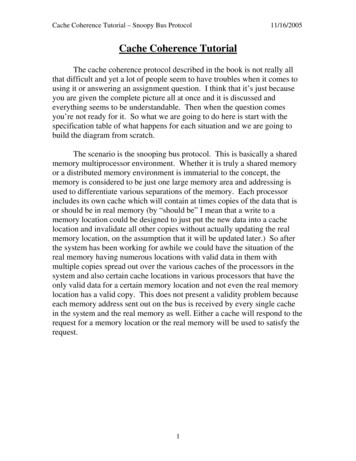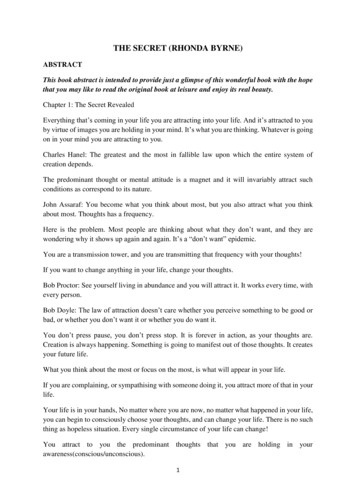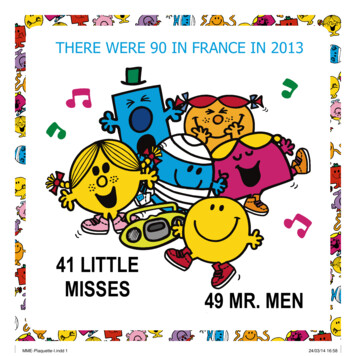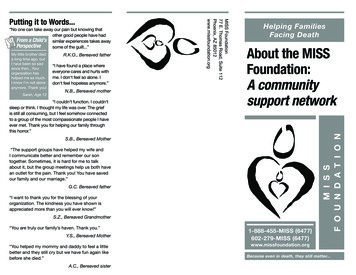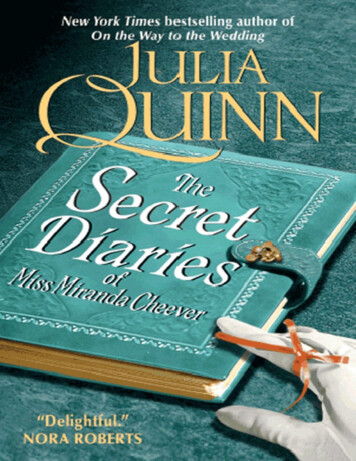
Transcription
JULIA QUINNThe Secret Diaries of Miss Miranda Cheever
DedicationFor all the people who tipped well at Friendly’s,enabling me to save up for my first computer,a Mac SE. (Sans hard drive—thanks, Dad!)And also for Paul,even though he has totally flaked on his promiseto turn said computer into a fishtank.
ContentsTitle PageDedicationPrologueAt the age of ten, Miss Miranda Cheever showed no Chapter 1Nigel Bevelstoke, better known as Turner to all who cared Chapter 2It would not have been an overstatement to say that Chapter 3Don’t be late?Chapter 4Turner had planned to spend the spring and summer in Chapter 5A week or so later, the sun was shining so Chapter 6“Winston will be here soon.” Olivia sailed into the rose Chapter 7Turner had been through one candle and three glasses of Chapter 8Turner woke up the next morning with a blistering headache Chapter 9Miranda spent the next week pretending to read Greek tragedies.Chapter 10Two days later, Turner still seemed to be in something Chapter 11Turner was so busy thinking about how much he’d like Chapter 12When Turner returned home the next day, he retreated into Chapter 13Turner wasn’t exactly certain why he had remained so long
Chapter 14Two hours later, Turner made another appearance. This time, Miranda Chapter 15Given the opposition against her, it was remarkable that Miranda Chapter 16Rosedale was, by aristocratic standards, of modest proportions. The warm Chapter 17The months passed, and the newlyweds settled into a comfortable Chapter 18The next morning, Turner dropped a gentle kiss on his Chapter 19The next few weeks were hideous. Turner took to having Chapter 20The doctor managed to staunch the bleeding, but he was About the AuthorOther Books by Julia QuinnCopyrightAbout the Publisher
PrologueAt the age of ten, Miss Miranda Cheever showed no signs of Great Beauty. Her hair was brown—lamentably—as were her eyes; and her legs, which were uncommonly long, refused to learn anythingthat could be remotely called grace. Her mother often remarked that she positively loped around thehouse.Unfortunately for Miranda, the society into which she was born placed great stock on femaleappearance. And although she was only ten, she knew that in this regard she was considered inferiorto most of the other little girls who lived nearby. Children have a way of finding these things out,usually from other children.Just such an unpleasant incident occurred at the eleventh birthday party of Lady Olivia and theHonorable Winston Bevelstoke, twin children of the Earl and Countess of Rudland. Miranda’s homewas quite close to Haverbreaks, the Rudlands’ ancestral home near Ambleside, in the Lake District ofCumberland, and she had always shared lessons with Olivia and Winston when they were inresidence. They had become quite an inseparable threesome and rarely bothered to play with theother children in the area, most of whom lived nearly an hour’s ride away.But a dozen or so times a year, and especially on birthdays, all the children of the local nobilityand gentry gathered together. It was for this reason that Lady Rudland let out a most unladylike groan;eighteen urchins were gleefully tramping mud through her sitting room after the twins’ party in thegarden was disrupted by rain.“You’ve mud on your cheek, Livvy,” Miranda said, reaching out to wipe it away.Olivia let out a dramatically weary sigh. “I’d best go to the washroom, then. I shouldn’t wantMama to see me thus. She quite abhors dirt, and I quite abhor listening to her tell me how much sheabhors it.”“I don’t see how she will have time to object to a little mud on your face when she’s got it all overthe carpet.” Miranda glanced over at William Evans, who let out a war cry and cannonballed onto thesofa. She pursed her lips; otherwise, she’d smile. “And the furniture.”“All the same, I had best go do something about it.”She slipped out of the room, leaving Miranda near the doorway. Miranda watched the commotionfor a minute or so, quite content to be in her usual spot as an observer, until, out of the corner of hereye, she saw someone approaching.“What did you bring Olivia for her birthday, Miranda?”Miranda turned to see Fiona Bennet standing before her, prettily dressed in a white frock with apink sash. “A book,” she replied. “Olivia likes to read. What did you bring?”Fiona held up a gaily painted box tied with a silver cord. “A collection of ribbons. Silk and satinand even velvet. Do you want to see?”“Oh, but I wouldn’t want to ruin the wrapping.”Fiona shrugged. “All you need to do is untie the cord carefully. I do it every Christmas.” Sheslipped off the cord and lifted the lid.Miranda caught her breath. At least two dozen ribbons lay on the black velvet of the box, eachexquisitely tied into a bow. “They’re beautiful, Fiona. May I see one?”
Fiona narrowed her eyes.“I haven’t any mud on my hands. See?” Miranda held her hands up for inspection.“Oh, very well.”Miranda reached down and picked up a violet ribbon. The satin felt sinfully sleek and soft in herhands. She placed the bow coquettishly against her hair. “What do you think?”Fiona rolled her eyes. “Not violet, Miranda. Everyone knows they are for blond hair. The colorpractically disappears against brown. You certainly can’t wear one.”Miranda handed the ribbon back to her. “What color suits brown hair? Green? My mama hasbrown hair, and I’ve seen her wear green ribbons.”“Green would be acceptable, I suppose. But it’s better in blond hair. Everything’s better in blondhair.”Miranda felt a spark of indignation rising within her. “Well, I don’t know what you’re going to dothen, Fiona, because your hair is as brown as mine.”Fiona drew back in a huff. “It is not!”“Is too!”“Is not!”Miranda leaned forward, her eyes narrowing menacingly. “You had better take a look in the mirrorwhen you go home, Fiona, because your hair is not blond.”Fiona put the violet ribbon back in its case and snapped the lid shut. “Well, it used to be blond,whereas yours never was. And besides that, my hair is light brown, which everyone knows is betterthan dark brown. Like yours.”“There’s nothing wrong with dark brown hair!” Miranda protested. But she already knew that mostof England didn’t agree with her.“And,” Fiona added viciously, “you’ve got big lips!”Miranda’s hand flew to her mouth. She knew that she was not beautiful; she knew she wasn’t evenconsidered pretty. But she’d never noticed anything wrong with her lips before. She looked up at thesmirking girl. “You have freckles!” she burst out.Fiona drew back as if slapped. “Freckles fade. Mine shall be gone before I turn eighteen. Mymother puts lemon juice on them every night.” She sniffed disdainfully. “But there’s no remedy foryou, Miranda. You’re ugly.”“She is not!”Both girls turned to see Olivia, who had returned from the washroom.“Oh, Olivia,” Fiona said. “I know you are friends with Miranda because she lives so close by andshares your lessons, but you must admit she isn’t very pretty. My mama says she’ll never get ahusband.”Olivia’s blue eyes sparkled dangerously. The Earl of Rudland’s only daughter had always beenloyal to a fault, and Miranda was her best friend. “Miranda will get a better husband than you, FionaBennet! Her father’s a baronet whereas yours is a mere mister.”“Being a baronet’s daughter makes little difference unless one has looks or money,” Fiona recited,repeating words she had obviously heard at home. “And Miranda has neither.”“Be quiet, you silly old cow!” Olivia exclaimed, stomping her foot on the ground. “This is mybirthday party, and if you can’t be nice, you may leave!”Fiona gulped. She knew better than to alienate Olivia, whose parents held the highest rank in the
area. “I’m sorry, Olivia,” she mumbled.“Don’t apologize to me. Apologize to Miranda.”“I’m sorry, Miranda.”Miranda stayed silent until Olivia finally kicked her. “I accept your apology,” she said grudgingly.Fiona nodded and ran off.“I can’t believe you called her a silly old cow,” Miranda said.“You must learn to stand up for yourself, Miranda.”“I was standing up for myself just fine before you came along, Livvy. I just wasn’t doing it soloudly.”Olivia sighed. “Mama says I haven’t an ounce of restraint or common sense.”“You don’t,” Miranda agreed.“Miranda!”“It’s true, you don’t. But I love you anyway.”“And I love you, too, Miranda. And don’t worry about silly old Fiona. You can marry Winstonwhen you grow up and then we’ll be sisters truly.”Miranda glanced across the room and eyed Winston dubiously. He was yanking on a little girl’shair. “I don’t know,” she said hesitantly. “I’m not sure I would wish to marry Winston.”“Nonsense. It would be perfect. Besides, look, he just spilled punch on Fiona’s dress.”Miranda grinned.“Come with me,” Olivia said, taking her hand. “I want to open my gifts. I promise I’ll squeal theloudest when I get to yours.”The two girls walked back into the room, and Olivia and Winston opened their gifts. Mercifully (inLady Rudland’s opinion), they finished at four o’clock on the button, which was the time that thechildren were meant to go home. Not a single child was picked up by servants; an invitation toHaverbreaks was considered quite an honor, and none of the parents wanted to miss the opportunityto hobnob with the earl and countess. None of the parents besides Miranda’s, that was. At fiveo’clock, she was still in the sitting room, assessing the birthday booty with Olivia.“I can’t imagine what has happened to your parents, Miranda,” Lady Rudland said.“Oh, I can,” Miranda replied cheerfully. “Mama’s gone to Scotland to visit her mama, and I’m surePapa has forgotten about me. He often does, you know, when he’s working on a manuscript. Hetranslates from the Greek.”“I know.” Lady Rudland smiled.“Ancient Greek.”“I know,” Lady Rudland said on a sigh. This was not the first time Sir Rupert Cheever hadmisplaced his daughter. “Well, you shall have to get home somehow.”“I’ll go with her,” Olivia suggested.“You and Winston need to put away your new toys and write thank-you notes. If you don’t do ittonight, you shan’t remember who gave you what.”“But you can’t send Miranda home with a servant. She’ll have no one to talk to.”“I can talk to the servant,” Miranda said. “I always talk to the ones at home.”“Not ours,” Olivia whispered. “They’re starched and silent and they always look at medisapprovingly.”“Most of the time you deserve to be looked at disapprovingly,” Lady Rudland interjected, giving
her daughter a loving pat on the head. “I have a treat for you, Miranda. Why don’t we have Nigelbring you home?”“Nigel!” Olivia squealed. “Miranda, you lucky duck.”Miranda raised her brows. She had never met Olivia’s older brother. “All right,” she said slowly.“I should like to finally meet him. You talk about him so often, Olivia.”Lady Rudland summoned a maid to fetch him. “You’ve never met him, Miranda? How odd. Well, Isuppose he’s usually only home at Christmas, and you always go to Scotland for the holiday. I had tothreaten to cut him off to get him home for the twins’ birthday. As it was, he wouldn’t attend the partyfor fear that one of the mamas would try to marry him off to a ten-year-old.”“Nigel is nineteen, and he is very eligible,” Olivia said matter-of-factly. “He’s a viscount. Andhe’s very handsome. He looks just like me.”“Olivia!” Lady Rudland said reprovingly.“Well, he does, Mama. I should be very handsome if I were a boy.”“You’re quite pretty as a girl, Livvy,” Miranda said loyally, eyeing her friend’s blond locks withjust a little envy.“So are you. Here, pick one of Fiona-cow’s ribbons. I don’t need them all, anyway.”Miranda smiled at her lie. Olivia was such a good friend. She looked down at the ribbons andperversely chose the violet satin. “Thank you, Livvy. I shall wear it to lessons on Monday.”“You called, Mother?”At the sound of the deep voice, Miranda turned her face to the doorway and almost gasped. Therestood quite the most splendid creature she had ever beheld. Olivia had said that Nigel was nineteen,but Miranda immediately recognized him as the man he already was. His shoulders were marvelouslybroad, and the rest of him was lean and firm. His hair was darker than Olivia’s but still streaked withgold, attesting to time spent out in the sun. But the best part about him, Miranda immediately decided,was his eyes, which were bright, bright blue, just like Olivia’s. They twinkled just as mischievously,too.Miranda smiled. Her mother always said that one could tell a person by his eyes, and Olivia’sbrother had very good eyes.“Nigel, would you please be so kind as to escort Miranda home?” Lady Rudland asked. “Herfather seems to have been detained.”Miranda wondered why he winced when she said his name.“Certainly, Mother. Olivia, did you have a good party?”“Smashing.”“Where is Winston?”Olivia shrugged. “He’s off playing with the saber Billy Evans gave him.”“Not a real one, I hope.”“God help us if it is,” Lady Rudland put in. “All right, Miranda, let’s get you home. I believe yourcloak is in the next room.” She disappeared through the doorway and emerged a few seconds laterwith Miranda’s serviceable brown coat.“Shall we be off, Miranda?” The godlike creature held out his hand to her.Miranda shrugged on her coat and placed her hand in his. Heaven!“I will see you on Monday!” Olivia called out. “And don’t worry about what Fiona said. She’s justa silly old cow.”
“Olivia!”“Well, she is, Mama. I don’t want to have her back.”Miranda smiled as she let Olivia’s brother lead her down the hall, Olivia’s and Lady Rudland’svoices slowly fading away. “Thank you very much for taking me home, Nigel,” she said softly.He winced again.“I’m—I’m sorry,” she said quickly. “I ought to be call ing you ‘my lord,’ oughtn’t I? It’s just thatOlivia and Winston always refer to you by your given name and I—” She cast miserable eyes towardthe floor. Only two minutes in his splendid company, and already she’d blundered.He stopped and crouched down so that she could see his face. “Don’t worry about the ‘my lord,’Miranda. I’ll tell you a secret.”Miranda’s eyes widened, and she forgot to breathe.“I despise my given name.”“That’s not much of a secret, Nig—I mean, my lord, I mean, whatever you wish to be called. Youwince every time your mother says it.”He smiled down at her. Something had tugged at his heart when he saw this little girl with the tooserious expression playing with his indomitable sister. She was a funny-looking little creature, butthere was something quite lovable about her big, soulful brown eyes.“What are you called?” Miranda asked.He smiled at her direct manner. “Turner.”For a moment he thought she might not answer. She just stood there, utterly still save for theblinking of her eyes. And then, as if finally reaching a conclusion, she said, “That’s a nice name. A bitodd, but I like it.”“Much better than Nigel, don’t you think?”Miranda nodded. “Did you choose it? I’ve often thought that people ought to choose their ownnames. I should think that most people would choose something different from what they have.”“And what would you choose?”“I’m not certain, but not Miranda. Something plainer, I think. People expect something differentfrom a Miranda and are almost always disappointed when they meet me.”“Nonsense,” Turner said briskly. “You are a perfect Miranda.”She beamed. “Thank you, Turner. May I call you that?”“Of course. And I didn’t choose it, I’m afraid. It’s just a courtesy title. Viscount Turner. I’ve beenusing it in place of Nigel since I went to Eton.”“Oh. It suits you, I think.”“Thank you,” he said gravely, completely entranced by this serious child. “Now, give me your handagain, and we shall be on our way.”He had held out his left hand to her. Miranda quickly moved the ribbon from her right hand to herleft.“What’s that?”“This? Oh, a ribbon. Fiona Bennet gave two dozen of them to Olivia, and Olivia said I might keepone.”Turner’s eyes narrowed ever so slightly as he remembered Olivia’s parting words. Don’t worryabout what Fiona said. He plucked the ribbon out of her hand. “Ribbons belong in hair, I think.”“Oh, but it doesn’t match my dress,” Miranda said in feeble protest. He’d already fastened it atop
her head. “How does it look?” she whispered.“Smashing.”“Really?” Her eyes widened doubtfully.“Really. I’ve always thought that violet ribbons look especially nice with brown hair.”Miranda fell in love on the spot. So intense was the feeling that she quite forgot to thank him for thecompliment.“Shall we be off?” he said.She nodded, not trusting her voice.They made their way out of the house and to the stables. “I thought we might ride,” Turner said.“It’s far too nice a day for a carriage.”Miranda nodded again. It was uncommonly warm for March.“You can take Olivia’s pony. I’m sure she won’t mind.”“Livvy hasn’t got a pony,” Miranda said, finally finding her voice. “She has a mare now. I’ve oneat home, too. We’re not babies, you know.”Turner suppressed a smile. “No, I can see that you are not. How silly of me. I wasn’t thinking.”A few minutes later, their horses were saddled, and they set off on the fifteen-minute ride to theCheever home. Miranda stayed silent for the first minute or so, too perfectly happy to spoil themoment with words.“Did you have a good time at the party?” Turner finally asked.“Oh, yes. Most of it was just lovely.”“Most of it?”He saw her wince. Obviously, she hadn’t meant to say so much. “Well,” she said slowly, catchingher lip between her teeth and then letting it go before continuing, “one of the girls said some unkindwords to me.”“Oh?” He knew better than to be overly inquisitive.And obviously, he was right, because when she spoke, she rather reminded him of his sister,staring up at him with frank eyes as her words spilled firmly from her mouth. “It was Fiona Bennet,”she said, with great distaste, “and Olivia called her a silly old cow, and I must say I’m not sorry thatshe did.”Turner kept his expression appropriately grave. “I’m not sorry that she did, either, if Fiona saidunkind things to you.”“I know I’m not pretty,” Miranda burst out. “But it’s dreadfully impolite to say so, not to mentiondownright mean.”Turner looked at her for a long moment, not exactly certain how to comfort the little girl. Shewasn’t beautiful, that was true, and if he tried to tell her that she was, she wouldn’t believe him. Butshe wasn’t ugly. She was just rather awkward.He was saved, however, from having to say anything by Miranda’s next comment.“It’s this brown hair, I think.”He raised his brows.“It’s not at all fashionable,” Miranda explained. “And neither are brown eyes. And I’m too skinnyby half, and my face is too long, and I’m far too pale.”“Well, that’s all true,” Turner said.Miranda turned to face him, her eyes looming large and sad in her face.
“You certainly do have brown hair and eyes. There is no use arguing that point.” He tilted his headand pretended to give her a complete inspection. “You are rather thin, and your face is indeed a triflelong. And you certainly are pale.”Her lips trembled, and Turner could tease her no more. “But as it happens,” he said with a smile,“I myself prefer women with brown hair and eyes.”“You don’t!”“I do. I always have. And I like them thin and pale, as well.”Miranda eyed him suspiciously. “What about long faces?”“Well, I must admit, I never gave the matter much thought, but I certainly don’t mind a long face.”“Fiona Bennet said I have big lips,” she said almost defiantly.Turner bit back a smile.She heaved a great sigh. “I never even noticed I had big lips before.”“They’re not so big.”She shot him a wary glance. “You’re just saying that to make me feel better.”“I do want you to feel better, but that’s not why I said it. And next time Fiona Bennet says you havebig lips, tell her she’s wrong. You have full lips.”“What’s the difference?” She looked over at him patiently, her dark eyes serious.Turner took a breath. “Well,” he stalled. “Big lips are unattractive. Full lips are not.”“Oh.” That seemed to satisfy her. “Fiona has thin lips.”“Full lips are much, much better than thin lips,” Turner said emphatically. He quite liked this funnylittle girl and wanted her to feel better.“Why?”Turner offered up a silent apology to the gods of etiquette and propriety before he answered, “Fulllips are better for kissing.”“Oh.” Miranda blushed, and then she smiled. “Good.”Turner felt absurdly pleased with himself. “Do you know what I think, Miss Miranda Cheever?”“What?”“I think you just need to grow into yourself.” The minute he said it, he was sorry. She would surelyask him what he meant, and he had no idea how to answer her.But the precocious little child simply tilted her head to one side as she pondered his statement. “Iexpect you’re right,” she finally said. “Just look at my legs.”A discreet cough masked the chuckle that welled up in Turner’s throat. “What do you mean?”“Well, they’re far too long. Mama always says that they start at my shoulders.”“They appear to begin quite properly at your waist to me.”Miranda giggled. “I was speaking metaphorically.”Turner blinked. This ten-year-old had quite a vocabulary, indeed.“What I meant,” she went on, “is that my legs are all the wrong size compared to the rest of me. Ithink that’s why I can’t seem to learn how to dance. I’m forever trodding on Olivia’s toes.”“On Olivia’s toes?”“We practice together,” Miranda explained briskly. “I think that if the rest of me catches up withmy legs, I won’t be so clumsy. So I think you’re right. I do have to grow into myself.”“Splendid,” Turner said, happily aware that he had somehow managed to say exactly the rightthing. “Well, we seem to have arrived.”
Miranda looked up at the gray stone house that was her home. It was located right on one of themany streams that connected the lakes of the district, and one had to cross over a little cobbled bridgejust to reach the front door. “Thank you very much for taking me home, Turner. I promise I’ll nevercall you Nigel.”“Will you also promise to pinch Olivia if she calls me Nigel?”Miranda let out a little giggle and clapped her hand to her mouth. She nodded.Turner dismounted and then turned to the little girl and helped her down. “Do you know what Ithink you should do, Miranda?” he said suddenly.“What?”“I think you ought to keep a journal.”She blinked in surprise. “Why? Who would want to read it?”“No one, silly. You keep it for yourself. And maybe someday after you die, your grandchildren willread it so they will know what you were like when you were young.”She tilted her head. “What if I don’t have grandchildren?”Turner impulsively reached out and tousled her hair. “You ask a lot of questions, puss.”“But what if I don’t have grandchildren?”Lord, she was persistent. “Perhaps you’ll be famous.” He sighed. “And the children who studyabout you in school will want to know about you.”Miranda shot him a doubtful look.“Oh, very well, do you want to know why I really think you should keep a journal?”She nodded.“Because someday you’re going to grow into yourself, and you will be as beautiful as you alreadyare smart. And then you can look back into your diary and realize just how silly little girls like FionaBennet are. And you’ll laugh when you remember that your mother said your legs started at yourshoulders. And maybe you’ll save a little smile for me when you remember the nice chat we hadtoday.”Miranda looked up at him, thinking that he must be one of those Greek gods her father was alwaysreading about. “Do you know what I think?” she whispered. “I think Olivia is very lucky to have youfor a brother.”“And I think she is very lucky to have you for a friend.”Miranda’s lips trembled. “I shall save a very big smile for you, Turner,” she whispered.He leaned down and graciously kissed the back of her hand as he would the most beautiful lady inLondon. “See that you do, puss.” He smiled and nodded before he got on his horse, leading Olivia’smare behind him.Miranda stared at him until he disappeared over the horizon, and then she stared for a good tenminutes more.Later that night, Miranda wandered into her father’s study. He was bent over a text, oblivious to thecandle wax that was dripping onto his desk.“Papa, how many times do I have to tell you that you need to watch the candles?” She sighed andput the candle in a proper holder.“What? Oh, dear.”“And you need more than one. It’s far too dark in here to read.”
“Is it? I hadn’t noticed.” He blinked and then narrowed his eyes. “Isn’t it past your bedtime?”“Nanny said I could stay up an extra thirty minutes tonight.”“Did she? Well, whatever she says, then.” He bent over his manuscript again, effectivelydismissing her.“Papa?”He sighed. “What is it, Miranda?”“Do you have an extra notebook? Like the ones you use when you’re translating but before youcopy out your final draft?”“I suppose so.” He opened the bottom drawer of his desk and rummaged through it. “Here we are.But what do you wish to do with it? That’s a quality notebook, you know, and not cheap.”“I’m going to keep a journal.”“Are you now? Well, that’s a worthy endeavor, I suppose.” He handed the notebook to her.Miranda beamed at her father’s praise. “Thank you. I shall let you know when I run out of spaceand need another.”“All right, then. Good night, dear.” He turned back to his papers.Miranda hugged the notebook to her chest and ran up the stairs to her bedroom. She took out a potof ink and a quill and opened the book to the first page. She wrote the date, and then, afterconsiderable thought, wrote a single sentence. It was all that seemed necessary.2 MARCH 1810Today I fell in love.
Chapter 1Nigel Bevelstoke, better known as Turner to all who cared to court his favor, knew a great manythings.He knew how to read Latin and Greek, and he knew how to seduce a woman in French and Italian.He knew how to shoot a moving target while atop a moving horse, and he knew exactly how muchhe could drink before surrendering his dignity.He could throw a punch or fence with a master, and he could do them both while recitingShakespeare or Donne.In short, he knew everything a gentleman ought to know, and, by all accounts, he’d excelled inevery area.People looked at him.People looked up to him.But nothing—not one second of his prominent and privileged life—had prepared him for thismoment. And never had he felt the weight of watchful eyes so much as now, as he stepped forwardand tossed a clump of dirt on the coffin of his wife.I’m so sorry, people kept saying. I’m so sorry. We’re so sorry.And all the while, Turner could not help but wonder if God might smite him down, because all hecould think was—I’m not.Ah, Leticia. He had quite a lot to thank her for.Let’s see, where to start? There was the loss of his reputation, of course. The devil only knew howmany people were aware that he’d been cuckolded.Repeatedly.Then there was the loss of his innocence. It was difficult to recall now, but he had once givenmankind the benefit of the doubt. He had, on the whole, believed the best of people—that if he treatedothers with honor and respect, they would do the same unto him.And then there was the loss of his soul.Because as he stepped back, clasping his hands stiffly behind him as he listened to the priestcommit Leticia’s body to the ground, he could not escape the fact that he had wished for this. He hadwanted to be rid of her.And he would not—he did not mourn her.“Such a pity,” someone behind him whispered.Turner’s jaw twitched. This was not a pity. It was a farce. And now he would spend the next yearwearing black for a woman who had come to him carrying another man’s child. She had bewitchedhim, teased him until he could think of nothing but the possession of her. She had said she loved him,and she had smiled with sweet innocence and delight when he had avowed his devotion and pledgedhis soul.
She had been his dream.And then she had been his nightmare.She’d lost that baby, the one that had prompted their marriage. The father had been some Italiancount, or at least that’s what she’d said. He was married, or unsuitable, or maybe both. Turner hadbeen prepared to forgive her; everyone made mistakes, and hadn’t he, too, wanted to seduce herbefore their wedding night?But Leticia had not wanted his love. He didn’t know what the hell she had wanted—power,perhaps, the heady rush of satisfaction when yet another man fell under her spell.Turner wondered if she’d felt that when he’d succumbed. Or maybe it had just been relief. She’dbeen three months along by the time they married. She hadn’t much time to spare.And now here she was. Or rather, there she was. Turner wasn’t precisely sure which locationalpronoun was more accurate for a lifeless body in the ground.Whichever. He was only sorry that she would spend her eternity in his ground, resting among theBevelstokes of days gone by. Her stone would bear his name, and in a hundred years, someone wouldgaze upon the etchings in the granite and think she must have been a fine lady, and what a tragedy thatshe’d been taken so young.Turner looked up at the priest. He was a youngish fellow, new to the parish and by all accounts,still convinced that he could make the world a better place.“Ashes to ashes,” the priest said, and he looked up at the man who was meant to be the bereavedwidower.Ah yes, Turner thought acerbically, that would be me.“Dust to dust.”Behind him, someone actually sniffled.And the priest, his blue eyes bright with that appallingly misplaced glimmer of sympathy, kept ontalking—“In the sure and certain hope of the Resurrection—”Good God.“—to eternal life.”The priest looked at Turner and actually flinched. Turner wondered what, exactly, he’d seen in hisface. Nothing good, that much was clear.There was a chorus of amens, and then the service was over. Everyone looked at the priest, andthen everyone looked at Turner, and then everyone looked at the priest clasping Turner’s hands in hisown as he said, “She will be missed.”“Not,” Turner bit off, “by me.”I can’t beli
The Secret Diaries of Miss Miranda Cheever. Dedication For all the people who tipped well at Friendly's, enabling me to save up for my first computer, a Mac SE. (Sans hard drive—thanks, Dad!) And also for Paul, even though he has totally flaked on his promise to turn said computer into a fishtank. Contents



